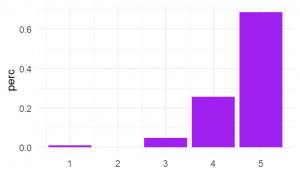The Details
To prevent the spread of COVID-19, the University of Manchester suspended in-person lectures during the 2020-21 academic year. Most lecturers recorded online videos for their students. However, Ralf Becker, a Professor of Economics Education in the Economics department, delivered content for his ECON10071/ECON20071 Advanced Mathematics unit through the Möbius digital platform.
The content was delivered asynchronously to the 975, mostly Year One students enrolled in the unit. In addition to text, the lessons in Möbius included dynamic content such as linked or embedded videos (with approximately 10 to 25 minutes of video included in each lesson). Interactive quiz questions were strategically placed throughout the material so students could check their understanding after reading or viewing a new concept. When students answered a question, they’d immediately see whether they’d been correct. Students could answer questions multiple times, and the instant feedback provided through the platform gave them further opportunities to consolidate their understanding. Students were also provided a PDF version of the lessons (without any interactive elements), so they could download the material and use it offline.
Becker held twice-weekly Review and Q&A sessions during which he went over key concepts, particularly those which emerged on the course unit’s discussion board as difficult. These sessions always finished with time in which students could raise further questions.
After the unit in January 2021, students completed a routine unit survey. Many commented on the usefulness of the online lessons and gave the unit and (its new delivery model) an average score of 4.41 out of 5.
Two open-text questions in the routine survey inquired which elements students appreciated and what needed improvement. Less than 10% of the students who responded to either of those questions expressed disapproval of how the course material was delivered. Two-thirds of the students who mentioned the Möbius online lessons in the context of improvements requested more videos and interactive questions.
The same cohort of students took a follow-on Advanced Statistics course unit in which the content was mainly delivered through pre-recorded online videos. Afterward, in May 2021, they received an online questionnaire requesting feedback regarding the Möbius platform. One question asked students to indicate how well the lessons contributed to their learning with a rating between 1 (worst contribution) and 5 (best contribution). As shown in the diagram below, more than 60% of responding students gave a rating of 5.
 The questionnaire also asked students about their preferred content delivery mode. Most of the surveyed students preferred asynchronous content delivery, either via online lessons or online videos. Only a minority (17%) indicated a preference for traditional lectures.
The questionnaire also asked students about their preferred content delivery mode. Most of the surveyed students preferred asynchronous content delivery, either via online lessons or online videos. Only a minority (17%) indicated a preference for traditional lectures.
“They really appreciated the fact that they had an asynchronous resource which also immediately allows them to test their understanding as they go through the material,” Becker said of his students. Students also liked the combination of text, videos, worked examples, and self-test questions. In addition, they valued being able to read or view lesson content at a time of their choosing.
“They really appreciated the fact that they had an asynchronous resource which also immediately allows them to test their understanding as they go through the material. This sort of content delivery will continue to be an option even as we return to mainly on-campus student experience.”
One aspect of the online textbook that Becker believes holds exciting prospects for future instruction is the capacity to randomize the questions. The platform’s math engine allows an instructor to present different versions of a question to different students. The answers adapt automatically as the questions change. “You can also deliver tests—even exams—through this engine and use this sort of randomization technology,” said Becker. “This is excellent, especially in times where students have to do exams remotely because it means that every student sees a somewhat different exam paper.”
You can also deliver tests – even examsthrough this engine and make use of this sort of randomization technology. This is excellent, especially in times where students have to do exams remotely because it means that every student sees a somewhat different exam paper.
Becker found that his remote instruction experience provided him with a significant leap in understanding how content can be delivered asynchronously. “So even when we’re allowed to go back to lectures in this particular course, I will keep using this resource,” he said. He foresees having time in face-to-face meetings for activities that supplement the textbook content and add to students’ understanding.
Although the pandemic forced the change, Becker believes that the interactive textbook has worked so well that he is advocating for others to consider using this model. He stated, “This sort of content delivery will continue to be an option even as we return to mainly on-campus student experience.”
To read the full case study of how Möbius was used for Dr. Ralf’s courses visit: Using an Online Interactive Textbook for Content Delivery
